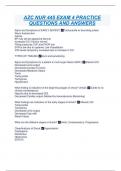AZC NUR 445 EXAM 4 PRACTICE
QUESTIONS AND ANSWERS
Signs and Symptoms of EARLY SEPSIS? ✅Tachycardia w/ bounding pulses
Warm flushed skin
Febrile
BP may still be appearing Normal
Increased CO if fluid is normal
Filling pressures CVP and PAOP low
SVR is low due to systemic Low Vasodilation
VO2 levels temporary increased due to increase in CO.
TYPES OF TRAUMA ✅blunt and penetrating
Signs and Symptoms for a patient in multi organ failure (MOF) ✅Altered LOC
Decreased urine output
Decreased Cardiac Function
Decreased Metabolic Status
Fever
Tachycardia
Tachypnea
Hypotension
What finding is indicative of the beginning stages of shock? (Initial) ✅Subtle to no
clinical manifestations
Hypoxia due to decreased D02
Decreased Cardiac output (Marked by Hemodynamic Monitoring)
What findings are indicative of the early stages of shock? ✅Altered LOC
Tachycardia
Tachypnea
Decreased urine output
Decreased Cap refill
Weak Pulses
What are the different stages of shock? ✅Initial, Compensatory, Progressive.
Classifications of Shock ✅Hypovolemic
Cardiogenic
Distributive
Obstructive
(DOCH)
,Potential cause of hypovolemic shock ✅External blood loss due to trauma, GI Bleed,
surgery.
Internal bleeding due to fractures, dissecting, aneurysms, hemothorax, retroperitoneal
bleed.
Fluid loss 2nd to severe vomiting, diarrhea, excessive urination or burns.
3rd space / transcellular fluid loss (pleural, peritoneal, joint spaces)
Protentional causes of cardiogenic shock ✅MI severe valvular dysfunction.
Severe heart failure.
Potential causes of distributive shock ✅Sepsis. Anaphylaxis. Brain injury, spinal injury,
or spinal anesthesia.
Potential causes of Obstructive Shock ✅Tension pneumothorax. Cardiac tamponade.
Severe Valvular Disease.
Distributive shock also includes what other types of shock? ✅Neurogenic,
anaphylactic, and septic.
The nurse understands that which of these increase as the delivery of oxygen to the
tissues falls below the tissues' requirements? (Select all that apply.)
A. VO2
B. Oxygen debt
C. SvO2
D. PaO2
E. Preload ✅A. V02
B. Oxygen Debt
Compensatory Stage of shock ✅Initiation of compensatory mechanisms is an effort to
maintain adequate volume, cardiac output, and blood flow tissue.
Mechanisms associated with compensatory stage? ✅Neural, endocrine and chemical
compensations.
Progressive Stage of shock ✅A failure of compensatory mechanisms leading to
increased hypoperfusion resulting in worsening metabolic acidosis, electrolyte
imbalances due to the failure of the sodium-potassium pump, and respiratory acidosis.
Refractory stage of shock ✅prolonged inadequate blood supply to the cells, resulting
in cell death and multisystem organ failure. There is a loss of aerobic metabolism, and
only extremely inefficient anaerobic metabolism is available. Shock is irreversible at this
stage.
The nurse monitors for which clinical manifestations in the patient in compensatory
shock?
, A. Low but normal blood pressure, oliguria
B. Cold extremities, hyperglycemia
C. Weak pulses, hypoventilation
D. Hypotension, tachycardia ✅A. Low but normal blood pressure, oliguria
. Clinical manifestations for compensatory shock include: Restlessness, confusion,
increased heart rate, tachypnea, respiratory alkalosis, oliguria, hyperglycemia,
decreased bowel sounds, weak pulses, and cool, moist skin. Compensatory
mechanisms may temporarily maintain a normal blood pressure. Cold extremities and
hypotension are associated with progressive shock. Not hypoventilation: resp. alkalosis
= deep rapid breathing/hyperventilation
S&S of Cardiogenic Shock ✅Tachycardia,
Tachypnea,
Dyspnea,
Hypotension,
Decreased urine output,
Dyspnea,
Crackles
Assessment findings indicating the patient is going into hypovolemic shock?
✅Tachycardia, restlessness, confused, decreased urine output, pulses weak, skin cool
clammy, skin cool and clammy, warm skin if not enough fluid, cap refill, loosing weight.
What immediate actions should the nurse take for a patient in hypovolemic shock?
✅1st Give oxygen (ABC's)
Fluid resuscitation,
Find and treating underline treatment and cause.
Medications used for anaphylactic shock? ✅Fluids, Vasopressors, Epi, corticosteroids,
Benadryl
What findings indicate sepsis? ✅Fever, tachy, hypertension, restlessness.
Signs & Symptoms of MODS/MOF = ✅Confusion (Altered LOC)
Dyspnea
Oliguria (UO less than 20mls)
Decreased Cardiac Output
Tachycardia
Fever
Hypotension
Tachypnea
Decreased Metabolic Status
Later signs of MODS ✅Tachycardia




